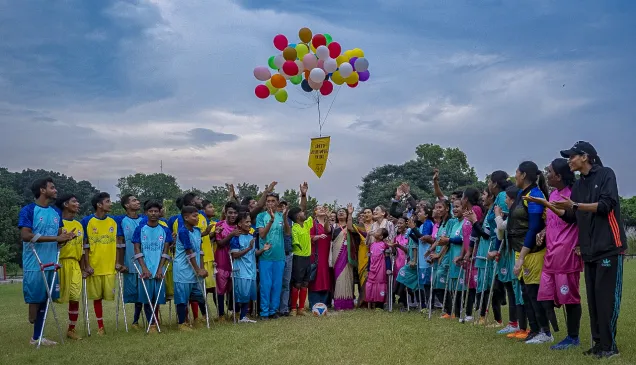International Women's Day: Towards an equal world
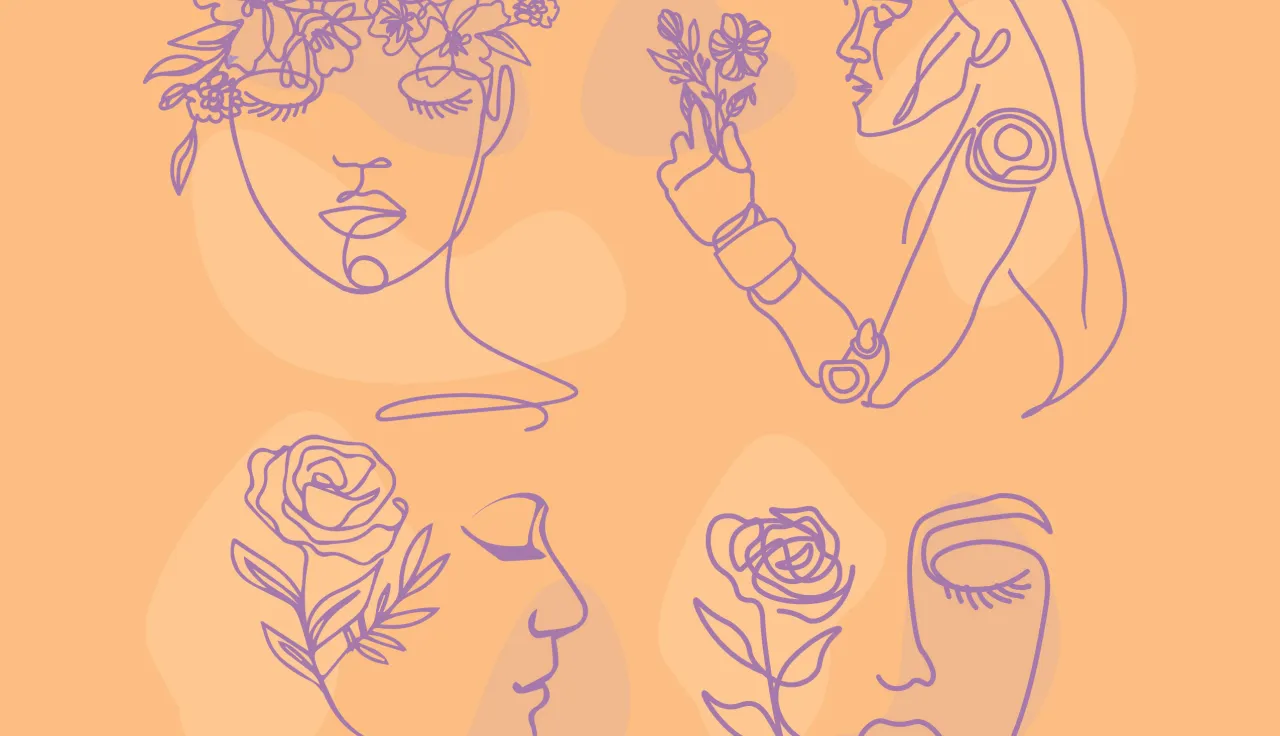
Stories from Asia-Pacific to mark International Women’s Day 2023 challenge stereotypes and celebrate inclusion.
Bangladesh: Taking inspiration from her patients' strength
For Anita Rani Sarker, an associate prosthetist-orthotist in Bangladesh, this International Women's Day is a special one. For, it celebrates her patients' courage and extraordinary willpower to overcome their challenges. One such patient is 20-year-old Shakila, who recently reached a milestone many take for granted – that of standing on both her legs, a breakthrough that could only happen because of Anita's innovative thinking.
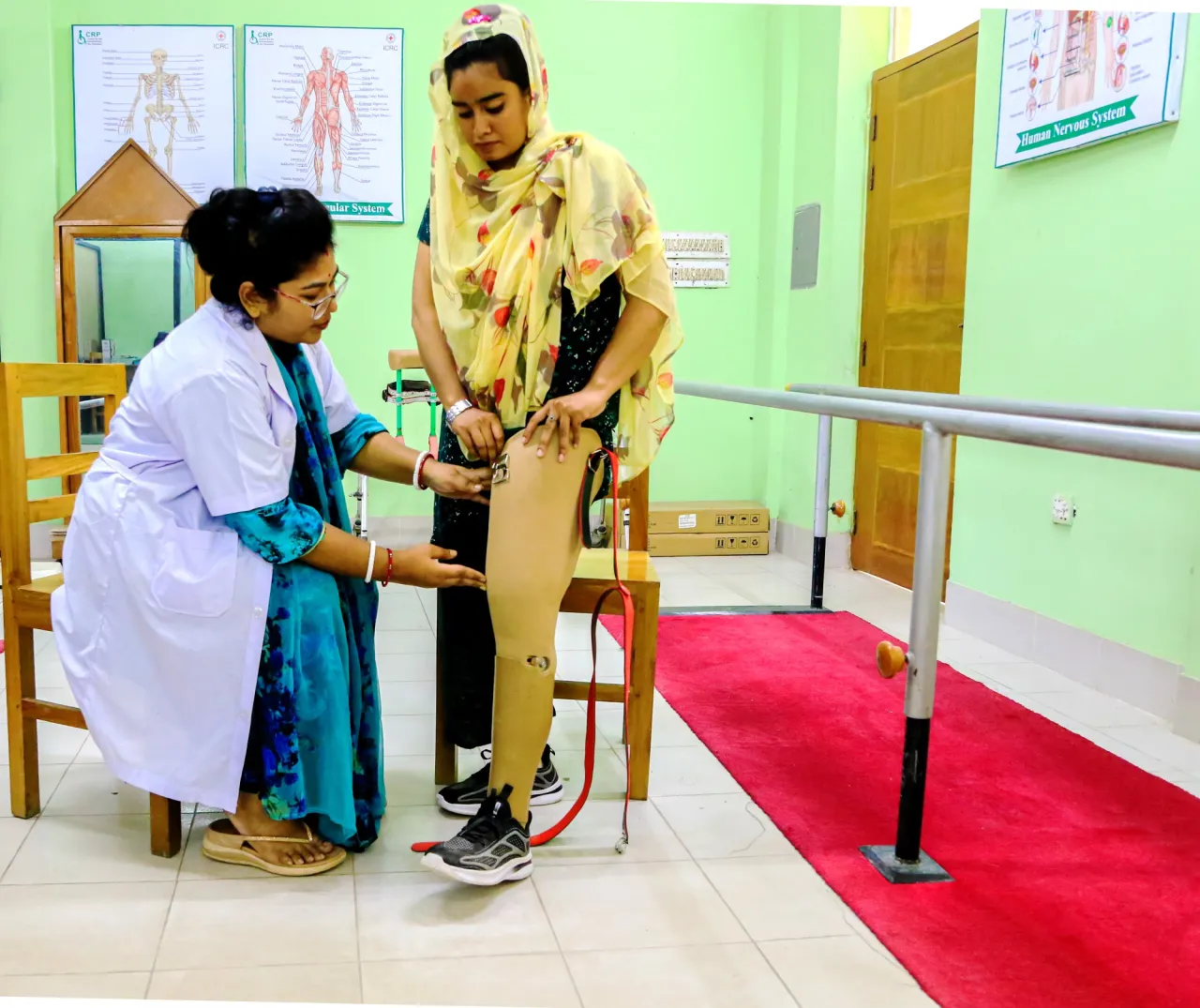
Anita Rani Sarker helping her patient Shakila stand on both her legs at an ICRC-supported Physical Rehabilitation Centre in Savar in Dhaka, Bangladesh.
Working at an ICRC-supported Physical Rehabilitation Centre in Savar (Dhaka), Anita explained why Shakila's case was complicated and how she managed to find a solution. "Her left leg is too short and is curved outwards because of a congenital anomaly. She couldn't extend her left knee, thus not learning how to put weight on the leg. Having relied on crutches till now, she was determined to walk on her own without assistance."
It was Shakila's grit that pushed Anita to find an unusual solution. "It took time, effort and lots of work. But we finally designed her prosthesis in a way that the weight could be evenly distributed on her leg, instead of centering at one point. This has made the prosthesis work. She can now stand on both her legs!"
Anita's out-of-the-box thinking could potentially help Shakila regain her mobility one day.
Though we see many patients at our centre every day, Shakila is truly different. She is such a strong-willed person who really wanted to walk again and leave behind the life that has been dependent on crutches. She is a very brave woman, and we could only help her because of her courage and complete cooperation.
Inspired by the courage she witnesses on a daily basis, Anita shared: "In my line of work, I come across many vulnerable women and witness how their challenges get multiplied twofold because of their disability. While pursuing higher studies in this relatively new area of education in Bangladesh, I want to hone my skills in a manner that I'm able to better serve these marginalized women."
It's people like Anita and Shakila, who, with their resolve and determination, are paving the way for greater inclusion of women living with disabilities in Bangladesh.
Indonesia: Conquering unfamiliar bastions
Treading the road less taken has become second nature to Dinihari Puspita, programme adviser for the ICRC's unit dealing with military and armed forces at the Jakarta regional delegation. Though she graduated in science and worked in the corporate sector for a decade, she decided to follow her dream and joined the ICRC as an economic security field officer in 2003. If that wasn't a big enough shift, she pushed the envelope in 2008 and moved into a totally new role that involved working with the security forces. Having spent 20 years at the ICRC, Dinihari has created a niche for herself by not only challenging stereotypes but also persevering and becoming the face of the ICRC among the Indonesian security forces and military.
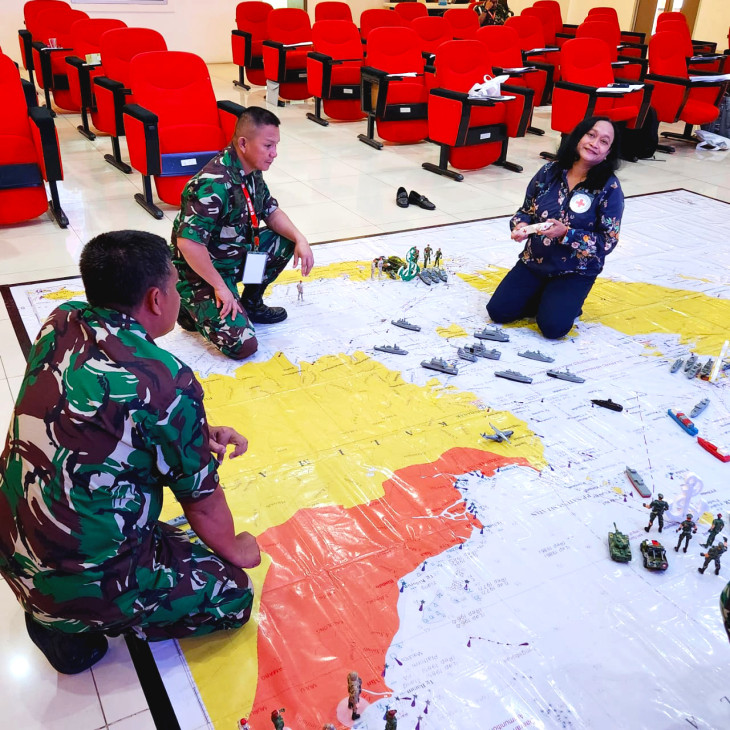
Dinihari Puspita has created a niche for herself by not only challenging stereotypes but also persevering and becoming the face of the ICRC among the Indonesian security forces and military. ICRC
"Coming from a non-military background, I did not realize how vast the country's military set-up was. Having conducted countless sessions for thousands of military personnel now, I can safely say that the learning never stops. I prepare myself well before workshops and interactions, regularly read the publications on international humanitarian law and the armed forces and ensure that I keep myself abreast of the changes within the military chain of command.
As far as being part of a unit that's considered male-dominated, I'm fortunate to have been surrounded by progressive and understanding people, including my husband (smiles). Even while studying, I was more interested in rock-climbing and hiking. Given my conditioning, I don't find work trips involving male colleagues awkward!"
I come from a big family and have nine siblings – I'm the middle child. My nieces and nephews, whom I am very close to, often ask me about my experience of working in the humanitarian world. I can tell you that they're quite impressed with my job and the travels I've done! In fact, I even encourage them to do voluntary work.
During some workshops, people presume that I'm the wife of a speaker and not the actual speaker herself. Surprisingly, it's mostly been women who've assumed this. They're often left stunned when I take the podium and start speaking!
Career highlights:
- Organized Senior Workshop on International Rules governing Military Operations (SWIRMO) 2022, an ICRC flagship event attended by 130 senior officers from 82 countries.
- Network and dialogue with TNI (Indonesia's national army) that deploys 450,000 military personnel, covering the joint command and three services (army-navy-air force), including their special forces.
- Led pre-deployment training sessions for peacekeepers (multiple each year, attended by over 2,000 personnel).
- Conducted 23 courses in economic security in the Asia-Pacific region and beyond.
- Tsunami Aceh response in 2005: Was part of the first batch deployed and stayed there for five months.
India: Learning to adapt and thrive
Preeti Srivastav had a longstanding dream to become a medical doctor. Recognizing the fierce competition for making it into medical school in India, she worked hard on achieving her goal. But a spinal injury changed things. Preeti was paralysed and had to adapt to a new way of life – one that involved a wheelchair.

Preeti Srivastav is finally fulfilling her longstanding dream to become a medical doctor. ICRC
While she underwent treatment, learned to use a wheelchair and dealt with the trauma of her injury, Preeti had to put her dream of becoming a doctor on hold. But she did not let it go. Now, over a decade since the accident, Preeti is pursuing Bachelor of Medicine, Bachelor of Surgery (MBBS) from a medical college in India. Juggling time between lectures, study hours, medical visits to a nearby village and practice sessions to present a group song at an upcoming event for college freshers, Preeti talks about life as it is right now.
"My father had made our home wheelchair accessible, but life at college and in the hostel has been a steep learning curve. Each day presents a fresh challenge," she says. Though the path ahead feels long and difficult, the support she receives from her mother, who has moved into the hostel with her, teachers and friends has been giving her the courage to not give up.
My friends leave for classes ten minutes earlier than usual so that they can take me along. Even in the laboratory, my classmates and professors try to ensure that I'm able to fully participate.
The way her family and friends are around her assures Preeti that she has not changed as a person. "They make plans that I can be a part of and talk to me about their challenges too. My friends even include my mother in their plans so that I can hang out with them. When my loved ones try so hard to make sure I thrive, why should I give up," she shares. Preeti adds that the ICRC's wheelchair user peer training, conducted in New Delhi in collaboration with Motivation India, has also shaped this attitude to life.
Drawing a sharp line between sympathy and empathy, Preeti says, "People should understand the capacities of a person with disabilities instead of making assumptions and pitying them. Everyone needs help with one thing or another in life and there are things that disabled people can help with too. My family knows there are things I cannot do, but there are some chores that only I am expected to carry out. It's simple things like these that ensure I don't feel excluded. To understand and then offer help is empathy."
Pakistan: Sumbal paves way for inclusive education
'Education for all' is 30-year-old Sumbal Sarwar's credo. Her lived experiences as a visually impaired person and as a teacher for sighted students over the last eight years have strengthened her resolve to constantly advocate for equal access to education for all. "This is the only way that people of all genders, especially women – that too women with disabilities – will be able to live a dignified life," this Fulbright scholar from Pakistan tells us.
Sumbal is a part of the National Forum of Women with Disabilities, an organization that the ICRC's physical rehabilitation team in Pakistan regularly works with. Having earned her master's degree in linguistics from Islamabad, Sumbal says studying in a regular school was no less than a miracle.
Though my school principal and teachers were not trained in special education, they did all they could to support me. This pushed me to try even harder. My grandfather and uncle were teachers, and I was inspired by them to pursue a career in education.
"In 2020, I got an opportunity to teach Urdu at an American university as part of the Fulbright Foreign Language Teaching Assistant (FLTA) programme. While the first semester was done online because of COVID-19 pandemic, I could finally travel and teach at the Michigan State University during the second semester."
This opportunity expanded Sumbal's horizons as she was able to carry out daily chores and make her way through the campus on her own. "In Pakistan, my sister is my guide and she accompanies me whenever I step out. It's next to impossible to take public transport because of lack of accessibility options. Besides not being disabled-friendly, it's also not safe for women to be out there on their own. This exacerbates the exclusion," she shares.
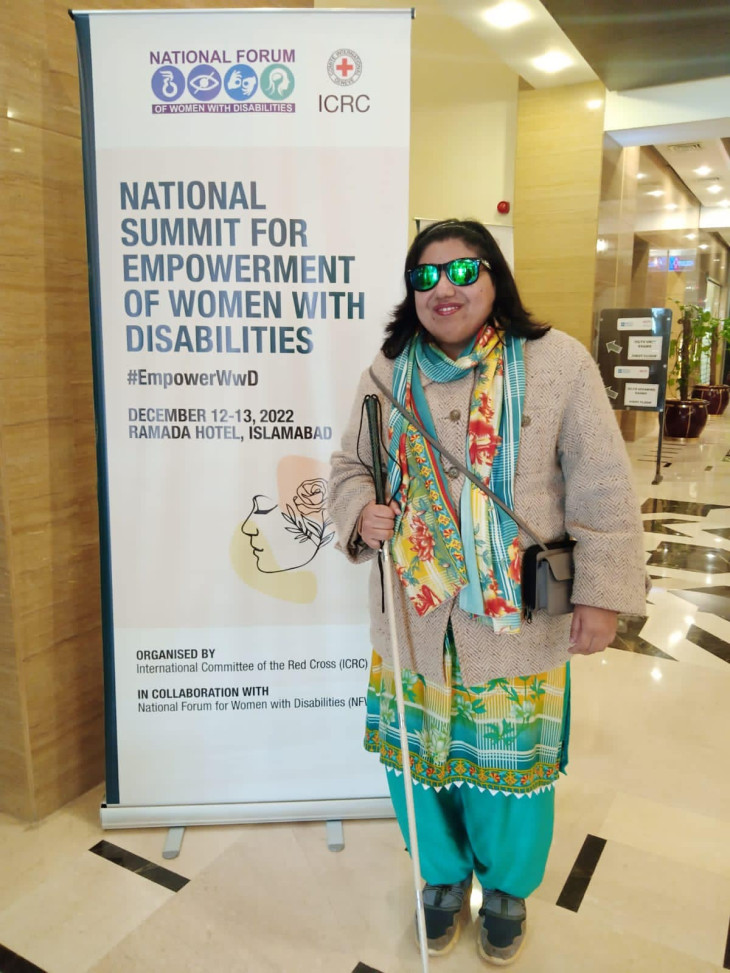
Talking about the biases that persist, Sumbal says women are marginalized in countries like India, Pakistan and Bangladesh. ICRC
Talking about the biases that persist, Sumbal says women are marginalized in countries like India, Pakistan and Bangladesh. The stereotyping worsens if you have a disability. "That's why I want to advocate for inclusive education. That's the only way people, especially women, will come to know of their rights, the opportunities that exist and their own potential. Women with disabilities need this chance as it can open the doors of their mind and that of the society."
Currently, Sumbal is teaching at three different places and her aim is to raise awareness about disability inclusion and the power of believing in oneself. Changing mindsets is the gateway to a healthier and more inclusive society, she signs off!
Cambodia: Meet and greet – Ho Chanthy
In 2012, when Ho Chanthy started playing wheelchair basketball, little did she know that it would make her more confident both on and off the court.
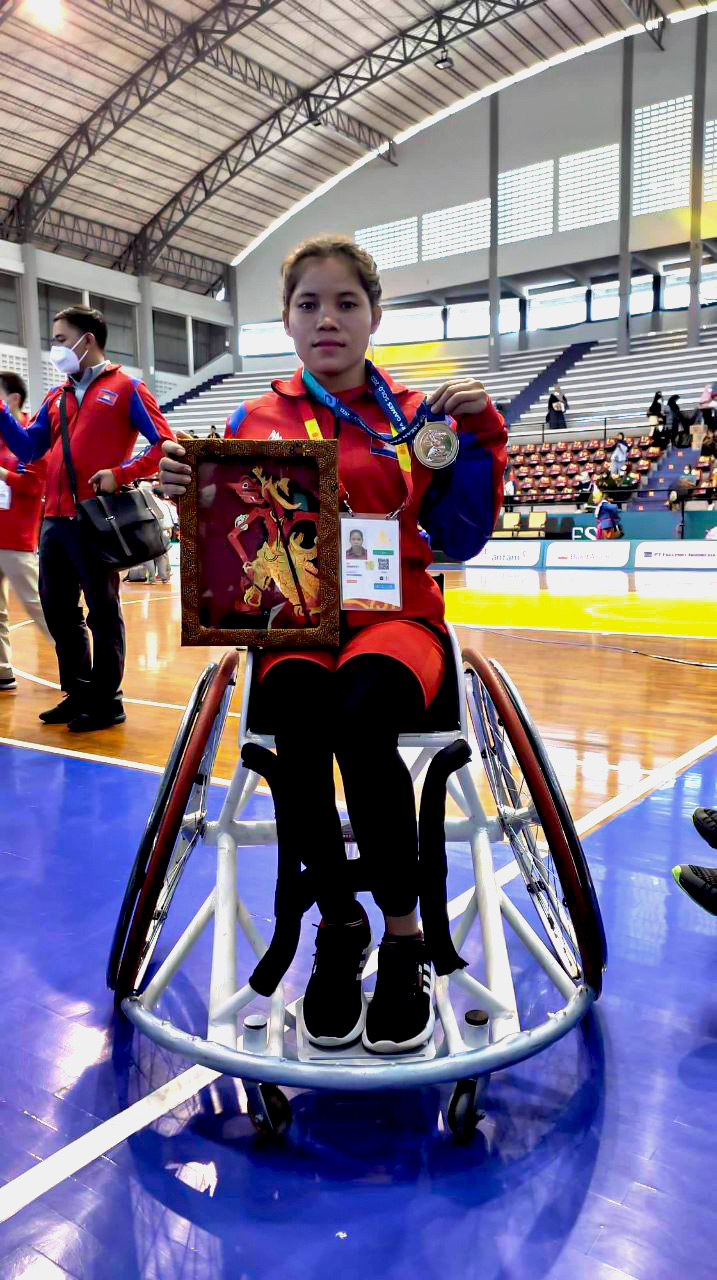
Ho Chanthy started playing wheelchair basketball in 2012 and is now a national athlete. ICRC
A cash grant recipient under the ICRC's microeconomic initiatives, Chanthy is also a proud member of Cambodia's wheelchair basketball team. She says the ICRC aid provided her with a platform where she could defy many stereotypes – whether related to her disability or her gender – and prove to the world that she is more than capable of supporting herself.
"Besides running a grocery shop, I'm also a wheelchair basketball player," Chanthy says. Sports, for Chanthy, has been all about building her confidence and demonstrating the power of hard work.
When I started playing basketball, it used to be difficult to even turn my wheelchair and catch the ball. But it's been over ten years and I am a national athlete today!
Keen to continue playing basketball for as long as she can, Chanthy says there are times when people assume that she needs their assistance or special treatment. "But that's not true. I want to show that with my hard work, I can do so much on my own without their help," Chanthy signs off from the lush fields of Battambang..

